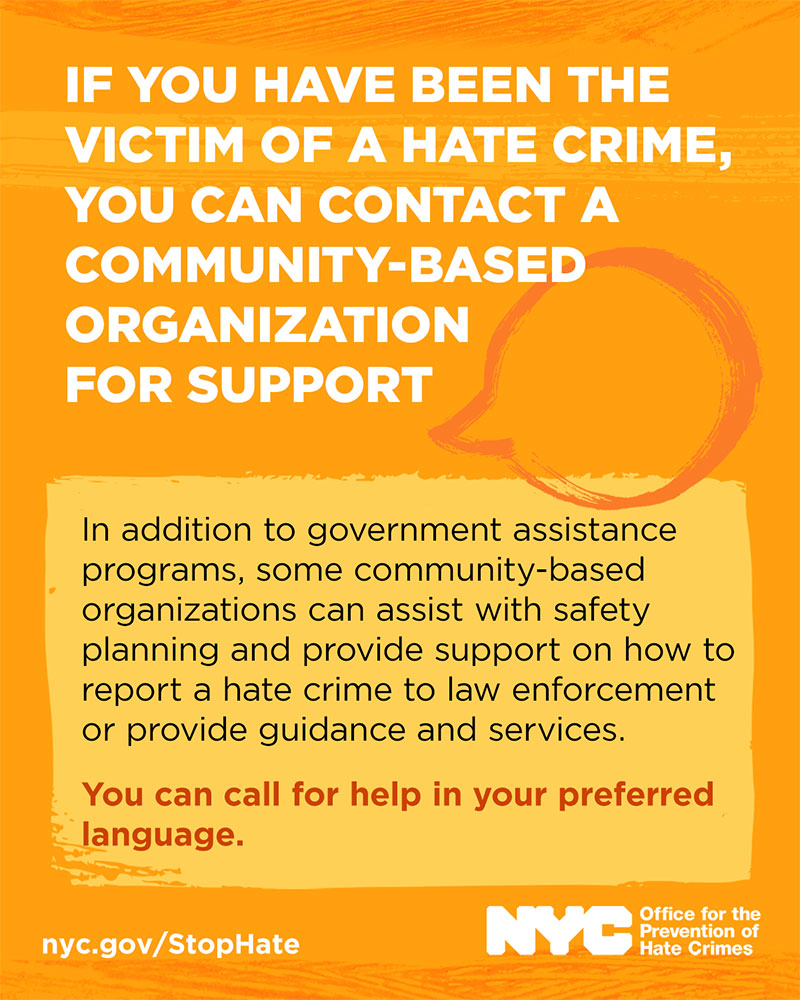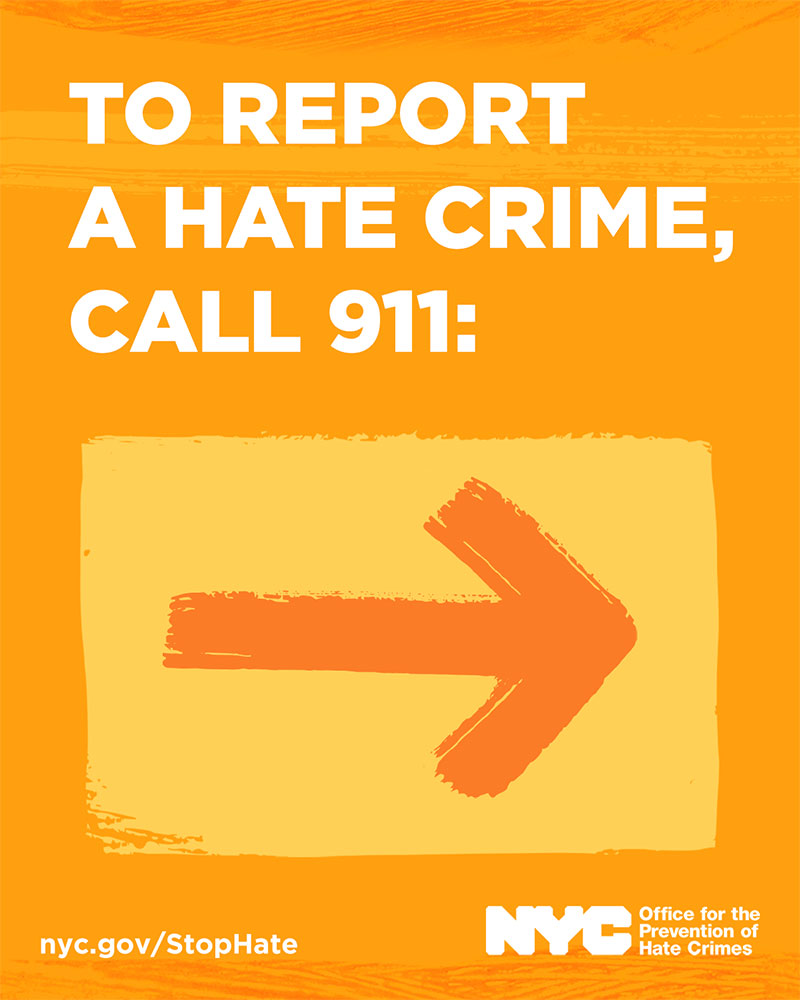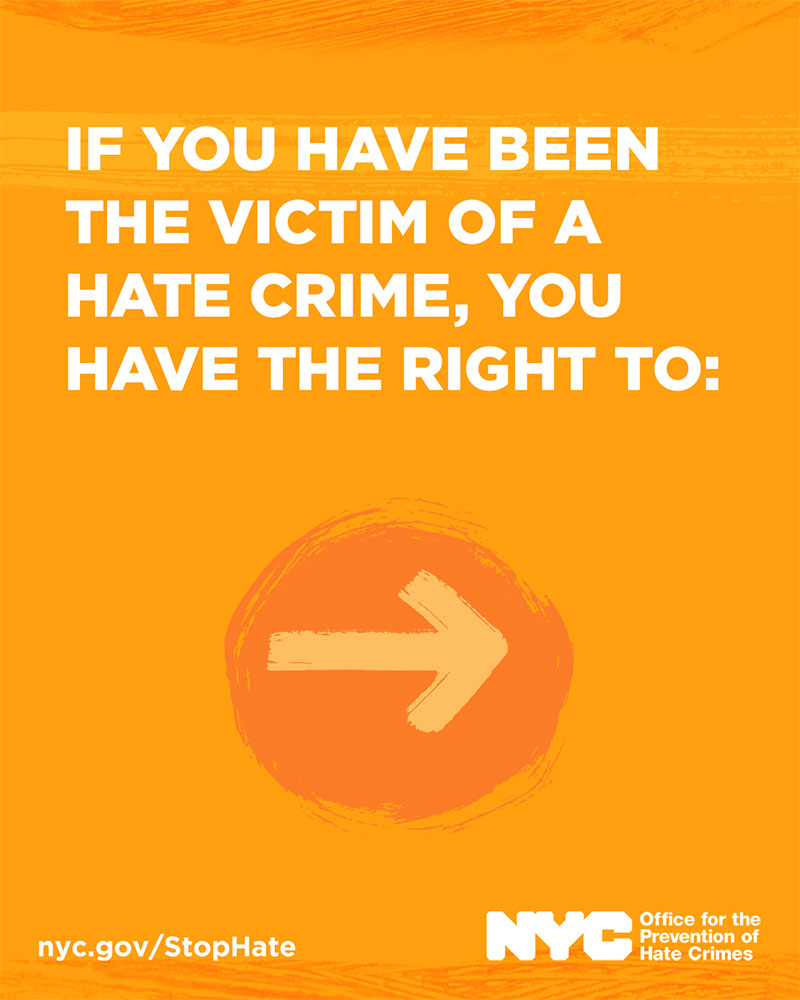
 Office for the Prevention of Hate Crimes311
Office for the Prevention of Hate Crimes311 Search all NYC.gov websites
Search all NYC.gov websites
Victim Support
Resources for Victims of Hate Crimes



Download the Hate Crimes Victims' Guide to Help. Guide also available in Arabic, Bengali, Chinese (Simplified), Chinese (Traditional), French, Haitian-Creole, Hebrew, Korean, Polish, Russian, Spanish, Urdu, and Yiddish.
Download the AAPI Hate Crimes Victims' Guide to Help. Guide also available in Chinese (Simplified), Chinese (Traditional), Khmer, Korean, and Vietnamese.
Download the resource graphics series, available in multiple sizes.
Victim Resources
There are also a number of government agencies on the local, state, and federal levels that offer services, resources, and support for victims of hate crimes. Click on a region below, or press the enter key on a region, to reveal its related resources.
New York City
City Commission on Human Rights (CCHR)
The New York City Commission on Human Rights handles bias-motivated cases that do not rise to the level of hate crimes, such as discriminatory harassment (e.g., name calling without threat of violence), and housing and employee discrimination. If you have experienced a bias incident or discriminatory harassment you can report it to the NYC Commission on Human Rights by calling 311 or 212-416-0197 or contact them online.
Mayor’s Office of Community Mental Health
The Mayor’s Office of Community Mental Health (OCMH) is committed to improving mental health outcomes for all New Yorkers and ensuring that more people can get the mental health support they need to live healthy and content lives. OCMH advances its goals by coordinating the development of citywide policies and strategies to fill critical gaps in mental healthcare. The office works with City agencies to reduce barriers to mental health care for marginalized communities. Its priorities are rooted in equity, racial justice, and cultural responsiveness. OCMH adopts a community-centered and strength-based approach that recognizes diverse perspectives, lived experiences, resilience, and the unique needs of New Yorkers. To learn more, visit their website.
Crime Victim Assistance Program
Staffed by advocates from Safe Horizon, a leading victim assistance organization, the Crime Victim Assistance Program supports individuals and their loved ones through the immediate emotional, physical, and financial aftermath of any kind of crime or violence. Services do not require a police report and are free, confidential, and available in multiple languages, including:
- Counseling and connection to ongoing, long-term support
- Safety planning
- Help applying for crime victim compensation and public benefits
- Advocacy with landlords, employers, schools, and creditors
Find crime victim advocates at your local precinct
NYC 988
If you or a loved one are feeling overwhelmed or stressed, NYC 988 can help. NYC 988 is a free, confidential helpline for mental health support available 24 hours a day, 7 days a week, in over 200 languages. To speak to a counselor, call or text 988 or chat online at 988lifeline.org/chat.
Mayor's Office to End Domestic and Gender-Based Violence
The Mayor's Office to End Domestic and Gender-Based Violence collaborates with City agencies and community stakeholders to ensure access to inclusive services for survivors of domestic and gender-based violence and operates the New York City Family Justice Centers. If you experience intimate partner and family violence, elder abuse, sexual assault, stalking, and human trafficking you can call 1-800-621-HOPE (4673) or visit the NYC Hope Resource Directory for immediate safety planning, shelter, assistance, and other resources.
The New York City Family Justice Centers, located in all five boroughs can help address the legal, social service, and mental health needs of victims and their families, including:
- Crisis counseling and connections to ongoing support
- Individual and group therapy
- Safety planning
Find the Family Justice Center in your borough
Action NYC
These services, part of the Mayor's Office of Immigrant Affairs, offers free, safe immigration legal help in a network of trusted community-based organizations, public health facilities, public schools, and public libraries. Services are provided in multiple languages. Action NYC is for all New Yorkers - immigration status does not matter. Call 311 or 800-354-0365 for services and appointments.
Department for the Aging (DFTA)
The Department for the Aging mission works to eliminate ageism and ensure the dignity and quality of life for New York City's diverse older adults and for the support of their caregivers through service, advocacy, and education. Locate services, resources, and more at the DFTA website.
Mayor's Office for People with Disabilities (MOPD)
The Mayor's Office for People with Disabilities (MOPD) is the liaison between New York City government and the disability community. In partnership with all City offices and agencies, MOPD consistently ensures that the rights and concerns of the disability community are included in all City initiatives and that City programs and policies address the needs of people with disabilities. Those within the Deaf and Hard of Hearing community can now contact the Mayor's Office for People with Disabilities and get the information and resources they need in American Sign Language (ASL) by calling Video Phone: 646-396-5830. To learn more about how to be appointed a Disability Service Facilitator you can call Voice Phone: 212-788-2820 or visit the MOPD website.
Department of Health and Mental Hygiene (DOHMH)
The New York City Department of Mental Hygiene promotes and protects the health of all New Yorkers and actively works towards addressing enduring gaps in health between white New Yorkers and communities of color to advance health equity for all. If you need a provider, call NYC Health + Hospitals at 844-NYC-4NYC (844-692-4692), or visit the NYC HealthMap.
Unity Project
The Unity Project is the first-ever focused, citywide commitment to supporting and empowering LGBTQ young people. Working to advance the city's policies and programming around LGBTQ+ communities, the Unity Project has compiled a multitude of resources concerning peer and professional support, family support, school and education, health care and wellness, housing, employment, and healthy relationships on the Unity Project website.
New York State
New York State Office of Victim Services
The New York State Office of Victim Services (OVS) provides assistance to victims of crime in New York, including hate crimes. OVS funds 228 programs statewide that can provide direct services, such as crisis intervention and counseling, to victims of crime, including victims of hate crimes. These programs also can help crime victims apply for compensation from the agency, providing financial assistance for eligible individuals who have unreimbursed or unreimbursable, crime-related expenses.
Find help from a service provider through OVS
Read more about OVS
- The Office of Victim Services provides a safety net for crime victims and/or their family members, helping eligible individuals with crime-related expenses such as medical and counseling, funeral and burial, and lost wages and support, in addition to others. For such compensation, both victim and expense eligibility are determined by what the law allows. The agency also funds more than 200 victim assistance programs (VAPs) that provide direct services to all crime victims, including counseling, advocacy and legal services, among other help, across the state. While the eligibility factors for compensation have limitations, VAPs provide services to a larger population of crime victims, filling-in any gaps with direct assistance.
- Generally, any victim of any crime (i.e., misdemeanors and felonies, whether determined a hate crime or not) who suffers a physical injury is eligible for compensation. Once the individual's eligibility is determined, the type of expense is examined to determine if the expense itself is (1) eligible for reimbursement under the law and (2) not covered by a collateral source such as insurance. There are a limited number of enumerated crimes which make an individual eligible even if they did not suffer a physical injury. These include many crimes associated with domestic violence and hate crimes (i.e., those specified offenses listed in NYS Penal law, section 485.05) that do not result in a physical injury.
- New York State has the only such program in the country that does not have a cap on crime-related medical expenses (medical care and mental health counseling). All other eligible expenses are capped and include items such as: $500 for essential personal property, $2,500 for relocation, $2,500 for crime scene cleanup and securing a crime scene, $6,000 for burial, and $30,000 for loss of earnings or support or savings.
- The timelines for OVS claim determinations are fact-specific and mainly driven by the responsiveness of the applicant and related providers.
New York State Attorney General's Office
The Civil Rights Bureau of the New York State Attorney General's Office enforces laws that protect all New Yorkers from discrimination on the basis of race, color, national origin, sex, religion, age, marital status, sexual orientation, gender identity, military status, source of income or disability. Individuals who have experienced hate crimes and bias-based incidents are encouraged to call the ongoing hotline at 1-800-771-7755, or email civil.rights@ag.ny.gov.
New York State Division of Human Rights
The New York State Division of Human Rights enforces the state's Human Rights Law. The Human Rights Law prohibits discrimination in the provision of housing, employment, credit, and access to certain public places based on specified protected characteristics, which include age, race, gender, sexual orientation, and disability. The Division of Human Rights is responsible for investigating, prosecuting, and adjudicating complaints of discrimination brought under New York's Human Rights Law. If you have been discriminated against you can file a complaint online with the New York State Division of Human Rights.
New York State Hate Crimes Task Force
Run by the State Police with the assistance of the State Division of Human Rights, and the Division of Criminal Justice Services, the Task Force works together to prevent, investigate, and monitor Hate Crimes and violations of Human Rights Law. Residents who have experienced bias-motivated threats, harassment or discrimination are encouraged to call the toll-free hotline at 888-392-3644, text "HATE" to 81336 or you can file a complaint online with the New York State Hate Crimes Task Force.
Federal
Federal Bureau of Investigation (FBI)
The Federal Bureau of Investigation investigates the largest range of crimes including crimes committed against those based on biases of race, color, religion, national origin, perceived sexual orientation, gender identity, disability, or gender. The Victim Services Division (VSD) supports and assists victims of crimes investigated by the FBI in navigating the aftermath of crime and the criminal justice process. You can contact your local Federal Bureau of Investigation office to submit a tip electronically if you have information about a hate crime and can visit the Victim Services Division website to learn more about services and resources.
Community Support
NYC Crime Victim Services Finder
This map-based resource directory serves as a centralized locator of city-funded crime victim service providers for victims, advocates, and others who are interested in learning more about available services in New York City.
- The data included in the directory was self-reported by crime victim service providers that (1) are funded in whole or in part by the City and (2) provide services for individuals or groups who have been victims of crime.
- Each blue dot on the map represents a unique service location or a building that houses multiple service locations. Clicking any dot reveals essential information on that service location including address, website, phone number, services offered and eligibility criteria. Users can directly search providers based on address or provider name, and results can be refined based on victim age and crime type.
Visit the Crime Victim Services Finder site
Contact
If you are a crime victim service provider that is not currently included in this directory, or would like to update or remove your organization's current information, click the help tab in the directory.


